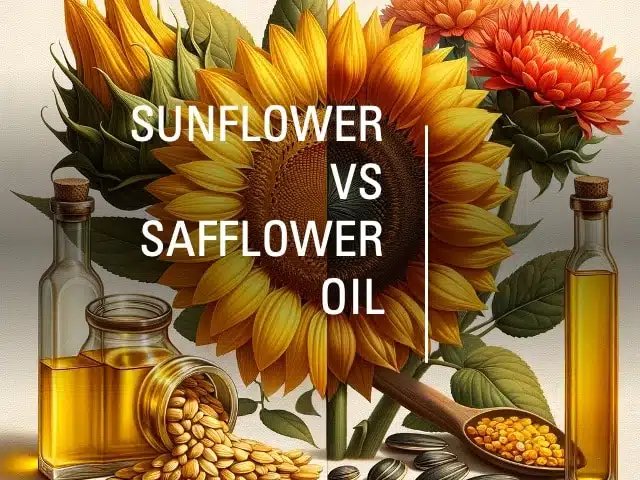Sunflower vs Safflower Oil: Which Cooking Oil is Healthier?
There are a few simple differences between sunflower oil and safflower oil, but they are both great for cooking and have beneficial health properties.
Sunflower oil is a beautiful creation from the sunflower plant.
To make sunflower oil, sunflower seeds are pressed to extract sunflower oil, resulting in a golden-yellow colored oil with loads of health benefits.
Safflower oil is similar to sunflower oil in many nutritional characteristics, and it is produced from a similar process but using safflower seeds instead.
Safflower oil and sunflower oil are similar, but choosing the right one could make a significant difference in your cooking!
Both safflower oil and sunflower oil serve as healthy alternatives to vegetable and other cooking oils, and they are perfect when you want to cook at high heat (such as using a deep fryer).
Other healthy oils, such as olive and coconut oil, are great for many purposes, but you cannot use them at high heat.
Keep reading below to learn more about the difference between sunflower oil and safflower oil!
Why Are Sunflower and Safflower Oil the Best Oils for High Heat Cooking?
Although there are tons of health benefits of sunflower and safflower oil, the main reason that these two are the best oils for deep frying is that they have a very high smoke point.
Smoke Point
Sunflower Oil: 440°F/225°C
Safflower Oil: 510°F/266°C
Understanding the smoke point of the deep fryer oil you use is crucial because oil with a low smoke point will produce toxic fumes and harmful free radical cells.
The key to finding the best oil for deep frying is to find an oil with a high smoke point but also a healthy fatty acid profile.
Although sunflower oil and safflower oil do not contain omega-3 fatty acids, they are rich in other beneficial nutrients, including linoleic acid, a type of polyunsaturated fat that may have a positive effect on cholesterol levels and blood sugar control.
Differences Between Sunflower and Safflower Oil

Sunflower and safflower oils are popular in kitchens for their high smoke points and health benefits, but they have distinct properties and advantages.
Sunflower oil, extracted from sunflower seeds, is notable for its vitamin E content and low saturated fat, making it ideal for various cooking methods and effective in reducing oxidative stress.
Safflower oil, made from safflower seeds, has a higher smoke point and is rich in monounsaturated and polyunsaturated fats, including a high concentration of linoleic acid, which is linked to lowering cholesterol and improving blood sugar control.
Both oils are excellent for high-heat cooking, with sunflower oil’s smoke point at 440°F and safflower oil’s at 510°F.
However, sunflower oil’s high omega-6 content could be pro-inflammatory if not balanced with omega-3s, while safflower oil is typically more expensive and less available.
Here is some more in-depth information about the differences between safflower and sunflower oil:
Health Benefits of Safflower Oil

Not only does safflower oil have a suitable smoke point for high-heat cooking, but it also has many other health benefits.
Linoleic Acid Content
- Prevent the Hardening of Arteries
- Lower Cholesterol
- Reduce the Risk of Heart Disease
- Manage Blood Sugar Levels
According to a study produced by National Product Research, about 70% of safflower oil is linoleic acid.
Linoleic acid is a polyunsaturated Omega-6 fatty acid, which means it is one of the few omega-6 fatty acids which is good for our health.
The typical Western diet is already higher in Omega-6 fatty acids than Omega-3 fatty acids, yet safflower oil still provides health benefits.
Diabetes Prevention & Management
The linoleic acid in safflower oil can help prevent and manage diabetes due to its linoleic acid content.
One study published in the Journal of Clinical Nutrition found that individuals with Type 2 diabetes who consumed a diet high in linoleic acid had significantly lower blood sugar levels compared to those who did not consume a diet high in linoleic acid.
Another study found that linoleic acid may improve insulin sensitivity and reduce the risk of developing type 2 diabetes in individuals with prediabetes.
Heart Health
Along with that, safflower oil can also help promote a healthy heart.
One study published in the American Journal of Clinical Nutrition found that individuals who consumed a diet high in linoleic acid had lower levels of total cholesterol and low-density lipoprotein (LDL) cholesterol, also known as “bad” cholesterol, compared to those who did not consume a diet high in linoleic acid.
Similarly, another study found that linoleic acid may increase the levels of high-density lipoprotein (HDL) cholesterol, also known as “good” cholesterol, in individuals with high cholesterol.
It is important to note that more research is needed to fully understand the relationship between linoleic acid and cholesterol levels, and the results of these studies should be interpreted with caution.
Weight Management
The presence of linoleic acid also may also promote a state of fat oxidization instead of fat storage due to the compound Conjugated Linoleic Acid (CLA).
Manufacturers often convert safflower oil into CLA supplements because it is a widely available source of this beneficial fatty acid that may have a positive effect on fat oxidation and storage.
One study published in the American Journal of Clinical Nutrition found that individuals who consumed a diet high in linoleic acid had a greater increase in fat oxidation (the process by which the body breaks down fat to use as energy) compared to those who did not consume a diet high in linoleic acid.
Another study found that linoleic acid may increase the expression of genes involved in fat metabolism and reduce the expression of genes involved in fat storage.
As you can see, choosing safflower oil is a simple and useful alteration for anyone who does a large amount of cooking since it assists in weight loss without making any major changes to the diet.
Oleic Acid Content
Although most safflower oil is linoleic acid, it also contains about 10% oleic acid.
Oleic acid is present in both animal and plant oils, and it is a monounsaturated Omega-9 fatty acid.
According to a study produced in Mini-Reviews in Medicinal Chemistry, similar to olive oil (also rich in oleic acid), safflower oil can present modulatory effects on wide physiological functions.
Potential areas of benefit are:
- Cancer
- Autoimmune Diseases
- Inflammatory Disease
- Wound Healing
Safflower oil does not contain as much oleic acid as olive oil, but it does contain enough to benefit your body.
Furthermore, oleic acid has direct benefits for your hair and scalp. Oleic acid helps increase circulation on the scalp, which strengthens follicles and stimulates hair growth.
It also can enable vibrant and shiny hair, explaining its use in many organic cosmetic applications.
The linoleic acid and oleic acid content of safflower oil make it an excellent deep fryer oil!
Health Benefits of Sunflower Oil

Sunflower seed oil shares many of the same health benefits as safflower oil, along with a few other unique benefits.
Low Saturated Fat Content
Versatility
Sunflower oil has a neutral flavor and high smoke point, making it suitable for a wide range of dishes and cooking methods.
Antioxidant Content
Sunflower oil is rich in various vitamins, minerals, and antioxidants. Specifically, sunflower oil contains a large amount of the powerful antioxidant Vitamin E.
Vitamin E possesses a compound known as tocopherols, a powerful antioxidant that helps eliminate free radical cells within the body.
Overall, intaking foods rich in Vitamin E is a great way to reduce oxidative stress.
The antioxidants found in Sunflower oil can affect the immune system positively greatly and empower the body to resist attacks from future infections.
Colon Cancer Protection
According to a study produced in the International Journal of Cancer Research, sunflower seeds are potentially effective as chemoprotective agents against colon cancer due to their high levels of phytochemicals, strong antioxidant properties, and ability to kill cancer cells.
Also, sunflower seeds had effects on enzymes and proteins involved in detoxification and inflammation
Best Sunflower & Safflower Oil Online
If you are interested in purchasing sunflower oil online, Baja Precious Organic Sunflower Oil is as good as it gets.
Baja Precious Organic Sunflower Oil is an organic sunflower oil with high oleic acid content. Also, it is all-natural and expeller-pressed.
Compared to other sunflower oils on the market, Baja Precious Organic Sunflower Oil is higher in monounsaturated fat and lower in both saturated and polyunsaturated fats.
For these reasons, Baja Precious Organic Sunflower Oil is both heart-healthy and an effective butter substitute.
Last update on 2025-04-15 / This article includes affiliate links/Images via Amazon Product Advertising API. I may earn commissions on purchases made through these links.
If you don’t want to drive to the grocery store to buy safflower oil, I suggest you purchase Hollywood Expeller-Pressed Safflower Oil on Amazon.
The Hollywood Expeller-Pressed Safflower Oil contains additional Vitamin E and is naturally expeller-pressed.
You can order one bottle for less than 9$, or sign up for a monthly subscription to save even more.
Last update on 2025-04-15 / This article includes affiliate links/Images via Amazon Product Advertising API. I may earn commissions on purchases made through these links.
Safflower Oil vs Sunflower Oil – Which is Better?
Safflower Oil is better suited for those:
- Looking for oil with a higher smoke point (510°F), making it ideal for high-heat cooking techniques like deep frying.
- Seeking to improve heart health and manage blood sugar levels due to its high linoleic acid content, a beneficial omega-6 fatty acid.
- Interested in a higher content of monounsaturated fats, particularly if choosing high-oleic versions of safflower oil, which may help reduce inflammation.
Sunflower Oil, on the other hand, is a preferable choice for those:
- Requiring an oil that is rich in vitamin E, an antioxidant that helps combat oxidative stress and support immune function.
- Looking for a versatile cooking oil with a neutral flavor, suitable for a variety of dishes.
- Focusing on low saturated fat options. Sunflower oil is also available in high-oleic varieties, which offer higher monounsaturated fats beneficial for heart health.
Sunflower oil, while lower in omega-6 than safflower oil, still requires consideration of overall dietary intake of fatty acids.
Neither oil is definitively better.
Instead, the choice depends on what fits best with your cooking style, health considerations, and dietary needs.
Both are healthy additions to a kitchen but serve slightly different purposes.





